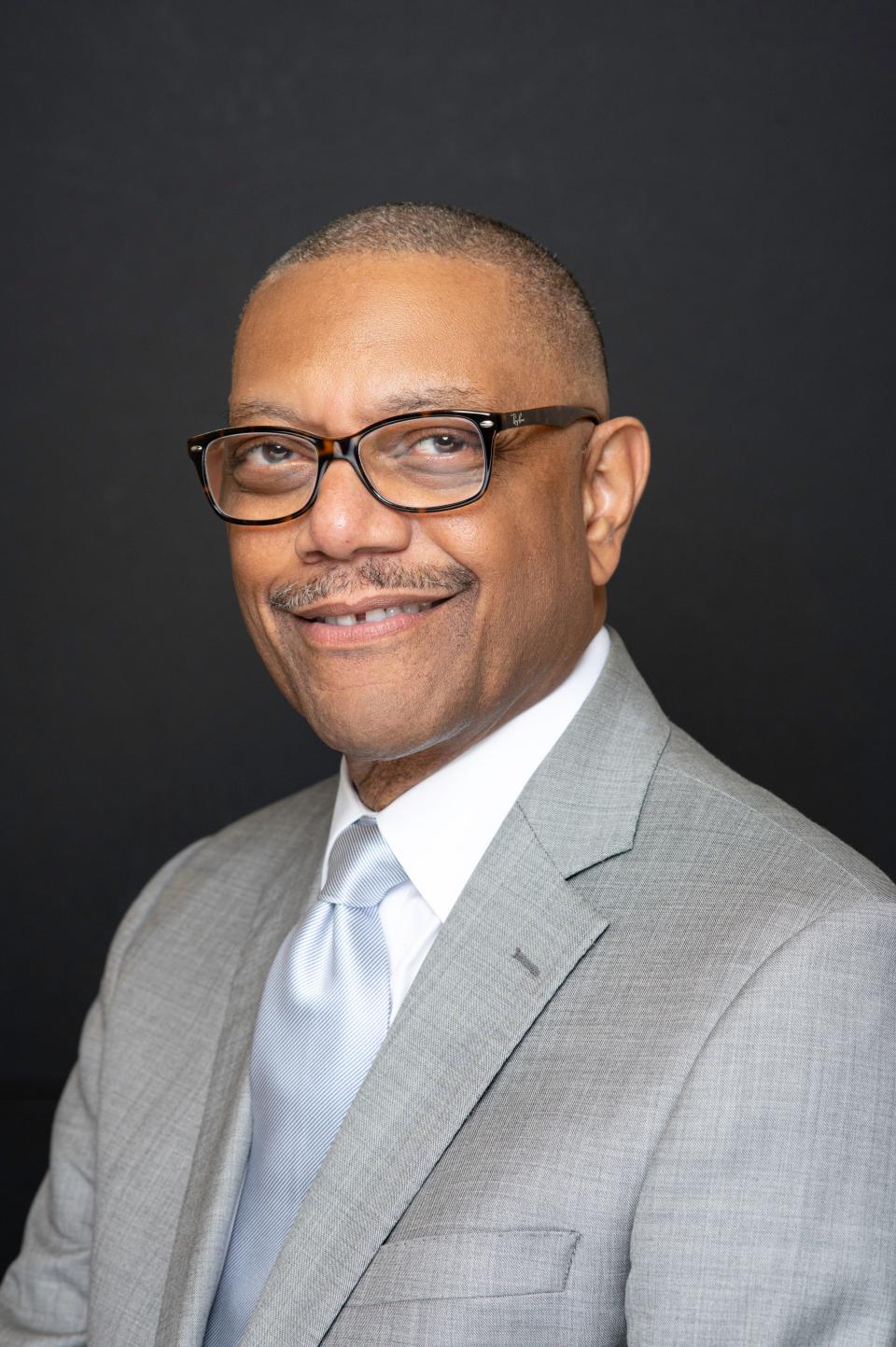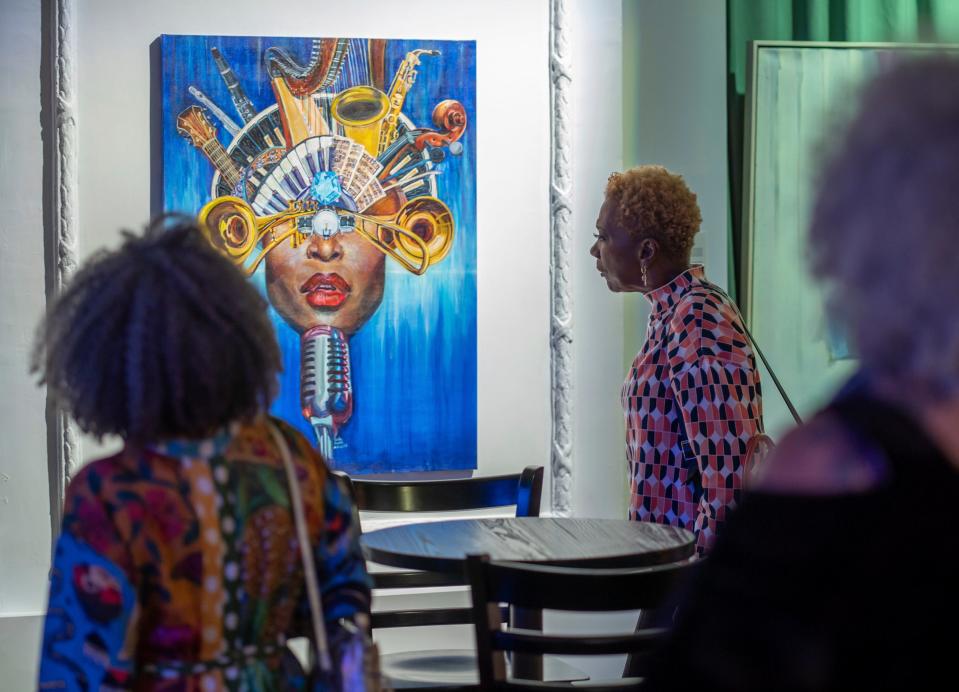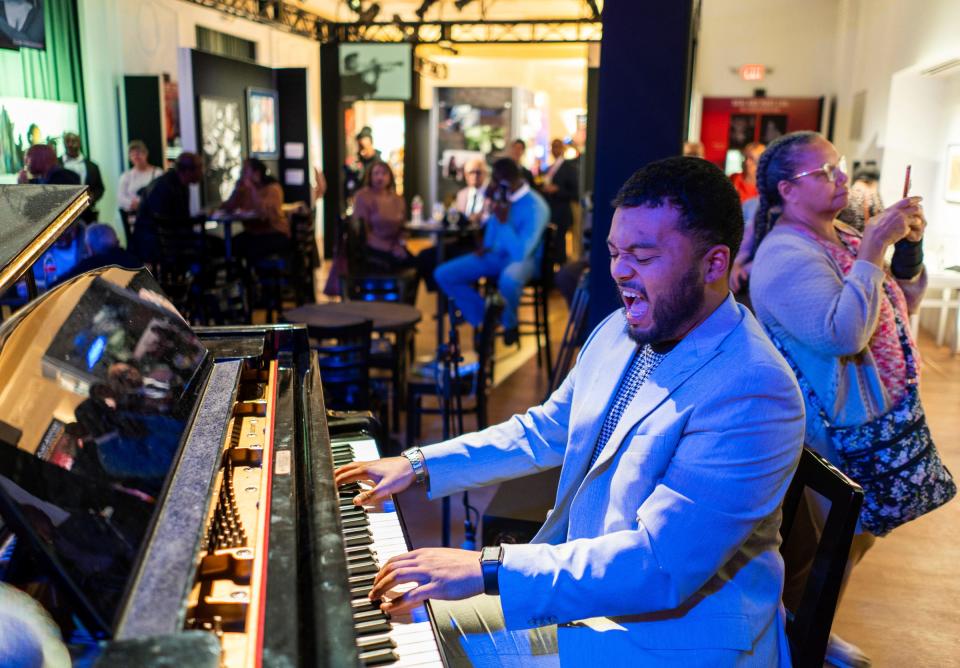Detroit's Carr Center, a key Black arts institution, says it's in danger of shutting down
One of Detroit’s cultural gems may be in danger of closing its doors.
The Carr Center, a Midtown institution based in the Park Shelton, is focused on bringing Black art to metro Detroit communities. But the center has suffered multiple setbacks since the start of the COVID-19 pandemic. Facing rising costs and significant debt, its leaders are hoping to find ways to continue striving for major-league achievements.
“The Carr Center is in the business of preserving, presenting, and promoting African American arts,” said CEO Oliver Ragsdale, Jr. “What we are looking to do is amplify the Black arts experience, lift up Black excellence in all of its forms, whether it is music, dance, visual arts, film, poetry and the written word. The arts are part of our everyday life, and within Black culture, the arts are central.”
More: After a year filled with losses, Carr Center emerges with new homes and a new outlook
The Carr Center was founded in 2009, born out of parent organization the Arts League of Michigan. It was once headquartered on East Grand River in the Harmonie Park area of downtown, but was forced out in 2017 as part of a redevelopment of that neighborhood.
Ragsdale has been in place for its entire existence. Over the years, Carr has become known for bold moves in artistic presentation, with groundbreaking shows and interactive exhibitions studded throughout the calendar year.
One example is 2023’s “SEEN/UNSEEN,” which featured Carr Center Artistic Director Terri Lyne Carrington leading a 15-piece jazz ensemble while world renowned visual artist Mickalene Thomas served as “video DJ,” splashing images and videos on a wall in response to the music being played.
More: Three internationally renowned artists to come together at Detroit's Carr Center

The center has also spent years cultivating a relationship with legendary choreographer Debbie Allen, whose Los Angeles-based dance studio coordinates an intensive summer dance workshop and showcase in Detroit annually.
“We started working together in 2018, introduced through the former president of the Kennedy Center,” said Ragsdale. “She came in and auditioned the kids, and we had a couple hundred kids who came out. A lot of them did not know her, but their parents and grandparents did. She came back and put a curriculum together. We have five people who work for her and report to her; they come in and they teach ballet, African, hip-hop, contemporary, jazz, and then we do a showcase performance.
“The thing that always strikes me is this is the same woman who has two Tony nominations, three Emmys, a Kennedy Center Honor and used to choreograph the Oscars with Quincy Jones as the music director. She comes in and teaches our kids. That’s pretty phenomenal.”
More: Famed choreographer Debbie Allen returns to Detroit for summer dance intensive
Allen told the Free Press she looks forward to working with the children each year.
“It’s really all about the kids,” she said. “Some of them will be returning students, some brand new faces. Being another path of light for the young people and where they might end up, and exposing them to maybe some dance techniques and styles they haven’t experienced … We try to push the level of their ability in that short period of time that we have. It’s a very short period of time, but every moment is well served. I can say that.
“Oliver Ragsdale is such a leader in his community when it comes to the arts and young people, music, dance, theater, every artistic aspect. When I see the programming that he does, the masterful artists that he brings that make themselves not only visible in a concert kind of way, but also accessible to the community to have chats, to have talks and master classes … The Carr Center is its own Kennedy Center right there in Detroit. That’s what it is.”

Kresge Foundation President Rip Rapson praised the center’s efforts as well.
“The Carr Center has created a unique role in the city’s cultural ecology as a gathering space that elevates and valorizes the sweep of the African and African American cultural experience,” said Rapson. “Where else could you find an encyclopedic exhibit for a treasured textile artist or participate in a ballet master class offered by the Debbie Allen Dance Academy or attend classes about the evolution of traditional African American art forms? The center is at once a steward of our city’s cultural patrimony, a catalyst for generational exchange and a laboratory for the next generation of cultural expression."
Despite Ragsdale and staff’s efforts, however, the pandemic hit hard. The Carr Center went from raising about $1.5 million with about $1 million in expenses in 2019 to generating about $800,000 in revenue and spending $1.1 million in 2023, leaving the organization with a $300,000 cash deficit, tax documents show.

“We’ve hit a struggle in trying to grow and coming out of the pandemic,” said Ragsdale. “We created an aggressive digital set of programming. Then, we opened a new space. It’s created a struggle, along with slower fundraising and people being slower to come back into arts facilities. We want to really be a sort of hybrid organization that is heavily into the digital world where we can take Detroit to the world, while at the same time having the in-person programming, performances, exhibitions that benefit the community here in Detroit.
"The initial number we need is about $600,000 to $700,000. That would take care of most of our debts that we've been dragging around for 18 months or so. $3.75 million would keep us going for a few years under the current nonprofit model. But we have a thought about a different kind of model, which is a $10 million investment over 10 years. The idea is that every year, on Jan. 1, you get $1 million, and that gives you the ability to be able to really sustain. Then you can budget and build momentum, you can build brand and continuity, you can grow, et cetera. That's the strategy we'd like to try to find a way to implement."
Having been with the organization for decades, Ragsdale is also eyeing retirement in the coming years, and expressed concern about finding a replacement who shares his passion.
"Whenever you're teetering as an organization," he said, "it becomes really difficult to get the people in place to be able to continue, and a lot of Black organizations don't necessarily make it after that change in leadership happens. We need to be sure we're set up for continuity and continued success. If you're nickel-and-diming, you can't make sure you get another Oliver."
He said the center's current average donation is about $50, and urged Detroiters to continue attending their events and consider larger donations.
"People need to keep coming," he said.
Dr. Mayowa Lisa Reynolds, principal of Detroit School of Arts, lamented the possibility of a future without the Carr Center as an institution in Detroit.
“That would be a travesty,” she said. “It’s iconic. It has impacted students throughout this city, some of whom have gone on professionally in the arts, and others whose lives have been enhanced. So it would be devastating, particularly as a primary arts organization that focuses on Black professionals and African American culture, a huge loss to the city of Detroit and beyond — because people come to the Carr Center from all over the nation.”
Ragsdale, in the meantime, is continuing to push forward, with spring and summer programming plans heavily underway, though finances continue to dwindle. His determination is palpable.
“The Carr Center is the only multidisciplinary, Black arts organization in town,” he said. “And in a city that is 80-plus percent African American, it's critical that a place exist that can help them help the broad community to know and understand and experience Black art from a Black perspective.”
Contact Free Press arts and culture reporter Duante Beddingfield at [email protected].
This article originally appeared on Detroit Free Press: Detroit's Carr Center says it's in danger of shutting down
